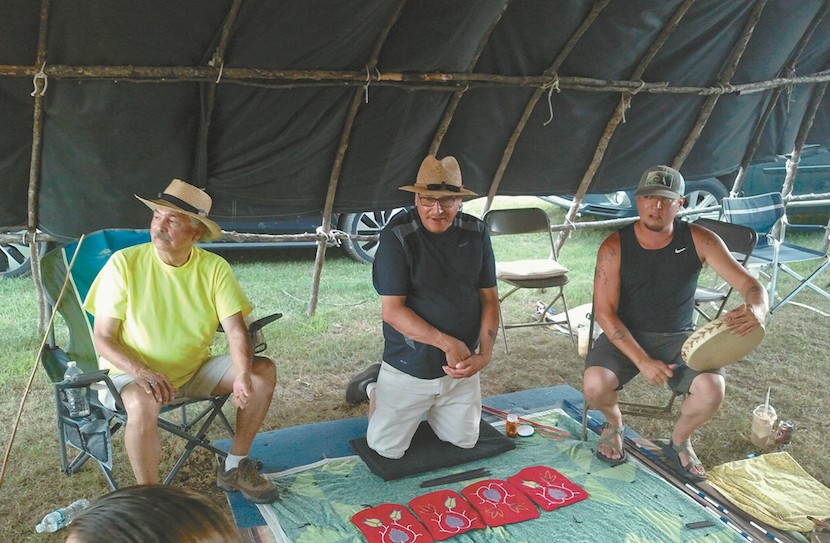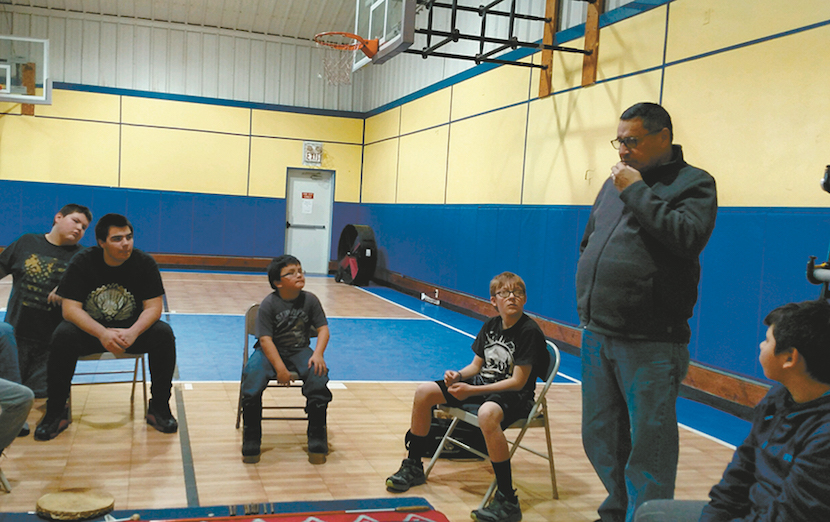
Makazinataagewin, the moccasin game, was banned by the U.S. government for generations. Missionaries and Indian agents were opposed to the game, which often involved gambling, so the federal government outlawed it for a time.
As a result, the game was forgotten in many communities and tribes. In recent years, however, the game has had a resurgence, thanks in part to a Mille Lacs Elder, the late Fred Jackson.
Dave Sam, a District I Elder who grew up in Chiminising, met Fred in Minneapolis in the 1970s, when Dave was running a halfway house for Indian men.
Although their program was having an impact on younger men, Dave and the counselors were having a hard time reaching the Elders. They decided they needed to see what made the older men tick, what they were passionate about.
“He was passionate about this thing called the moccasin game,” Dave said. “He started making the game parts — the pads, hand-carved hickory sticks, and hand drums. Then he started playing with the guys from the house.”
At the time, Dave didn’t have much interest in or knowledge of the game, but as time went on, that changed. He learned not only of the entertainment value of the game, but also of its healing power. As the old men played the game, their sobriety took hold and their friendships grew.
Fred, Dave, and other Band members from the Cities would drive up to Mille Lacs every week to play. Dave remembers driving through snow in his low-rider ’66 LeMans. “We’d get to the top of a hill and have to brush off all the snow that was causing it to overheat,” Dave recalled.
At a sobriety powwow Dave organized in Minneapolis, he put together a makazinataagewin tournament in the foyer of the American Indian Center. Teams came from Roseau Reserve in Ontario, and from Cass Lake, Red Lake, and other communities in Minnesota.
According to Wikipedia, the game was once played by most Native American tribes, but by the 1960s, only the Ojibwe in Minnesota still played. Old photos show men at Mille Lacs playing in 1885, and boys at Red Lake playing in 1938. Online videos and web pages show the game’s modern resurgence in Ho-Chunk and Navajo communities.
In recent years, Dave has devoted himself to spreading knowledge of the game throughout the Anishinaabe region, motivated by a desire to honor Fred and his passion for makazinataagewin.
He has friends at Red Lake and Fond du Lac who have the same passion and mission. Charles Grolla of Red Lake was just a boy when Dave and Fred visited Red Lake to play the game. He grew to love the game and recognize its value, and now he teaches men and boys in his community.
Jerry Ojibway from Fond du Lac is another teacher Dave works with. The three of them — Dave, Charlie, and Jerry — are hoping to standardize the rules of the game to make it easier to learn and to organize tournaments where everyone plays the same way.
Dave has been to northern Wisconsin and Minnesota to instruct children and adults, and at last summer’s powwow in District I, 10 teams — an unprecedented number — came to play from Red Lake, Fond du Lac, Red Cliff, Bad River, and Mille Lacs. In past years, only a handful of Mille Lacs teams would play in the tournament.
Next on Dave's agenda is planning a weekend tournament for next summer, with help from District I Representative Sandi Blake: the Fred Jackson Memorial Tournament.
“I want to do it in his name, because I firmly believe that the way this game has caught on now is because of this man’s passion,” Dave said.
Dave has traveled far since he first learned the game from Fred all those years ago. He’s been a Bush Foundation fellow and a student at Harvard, among other accomplishments.
Since it opened in 2004, Dave has been the manager of ML Wastewater, the wastewater treatment plant owned by the Band that serves the District I community as well as non-Indian residents of Garrison and Kathio Township.
But no matter where and how far he travels, he carries the memory of Freddy and his passion for makazinataagewin — the moccasin game.
Above: Dave Sam's team played makazinataagewin, the moccasin game, at the Mash-ka-wisen Veterans Powwow.
Below: Dave teaching at the Red Cliff winter language camp.

Makazinataagewin — A Sacred Story
The origin of makazinataagewin — the moccasin game — is described in a sacred story, or aadizookaan. Dave Sam, a District I Elder who grew up in Chiminising, tells the story when there’s snow on the ground, in keeping with Anishinaabe tradition.
“This is the legend I have heard that really brings it home to me,” said Dave. “Makwa, the bear, brought the game to a man who had lost his family. He was Anishinaabe and had a wife and two children. This man was really distraught. There was nothing the villagers could do for him. He had relatives that were bringing him food and trying to help him, but he was refusing all of it. He started getting weaker and was losing weight, so he decided the best thing would be to walk out in the woods and die. That’s what our people used to do when they got too old and sick to provide for themselves and their village.
“This man went out in the woods. He walked a long way and got really tired, and he finally stopped when he came to a clearing. There was a tree that had fallen over, so he sat on this log, and he looked off to the other side of the clearing. There was a man walking toward him, and this man had a bag on his shoulder. This man came over and asked him ‘What are you doing here?’
“The man who was sick said, ‘Whoever you are, either kill me or leave me alone.’ The second man sat down and talked with him. He was another Anishinaabe, and he got this man to talk, to tell him he didn’t want to live anymore. So he took the bag off his shoulder and said, ‘I have something to help you.’
“It was the makazinataagewin. He taught him how to play the game, and he took out some berries and dried meat, and the man took it and ate it and started feeling better. ‘This game is going to help the men of your tribe,’ said the visitor. ‘You need to take this back and teach them how to play it, and you’re going to have healthy men.’
“He gave the man the bag and the game and said, ‘I have to go now.’ As he turned away, he took four steps, and turned and looked back at the man, and from the knees down, he was covered in black fur. He took four more steps and turned around to look back, and from the waist down he was covered in black fur. He walked out four more steps, and from the shoulders down, black fur, and after four more steps, he was all covered in black fur, and he got down on all four legs and ran off. He was a makwa."
“Each piece of the game represents a part of the bear. The four pads are the four paws of the bear, and the shooting sticks represent the legs. He was also given some songs to sing, so when we play the game, we also sing and play the drum.”